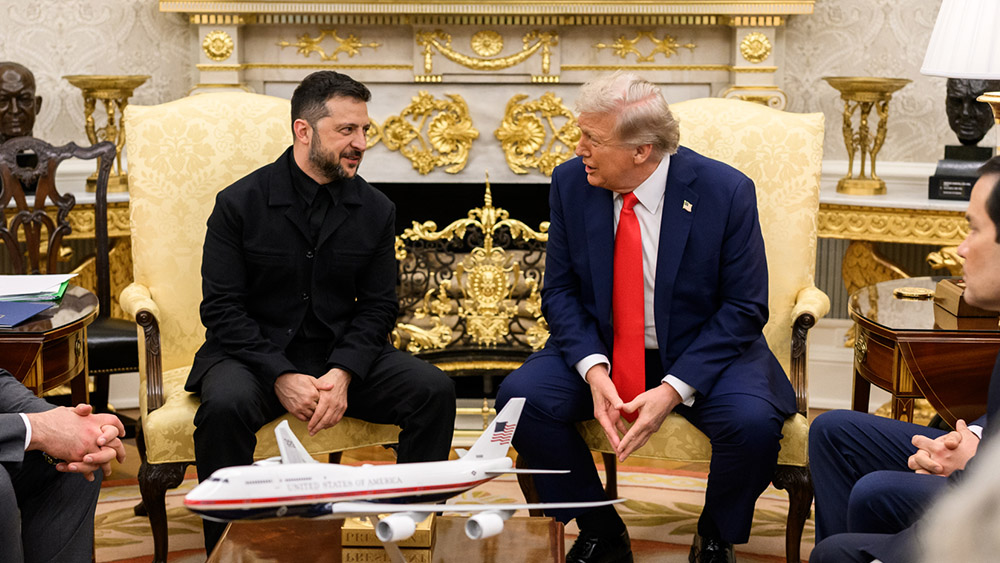 Parler
Parler Gab
Gab
- President Trump threatens 100 percent tariffs on all Chinese imports by Nov. 1, up from the current 30 percent, following China's restrictions on rare earth exports. China vows "resolute measures" in retaliation, raising fears of a full-blown "Trade War 2.0."
- Dow Jones plunges 879 points, wiping out $2 trillion in market value; futures suggest further losses. Bitcoin briefly crashes 8% before stabilizing as investors brace for volatility.
- China controls 80 percent of global rare earth production, restricting exports of holmium, erbium, thulium, europium and ytterbium—critical for military tech, EVs and electronics. U.S. accuses China of economic coercion, while Beijing claims export controls are not a ban.
- The escalation threatens global supply chains, tech decoupling and military modernization (F-35 jets, EVs, wind turbines depend on rare earths). It also risks fracturing alliances with EU, Japan and South Korea, while benefiting Russia and North Korea.
Markets in freefall: Investors brace for "Trade War 2.0"
The financial fallout was immediate. U.S. stock futures signaled another bloodbath on Wall Street, while London's FTSE 100 dropped nearly one percent on Friday. "This is a rather unwelcome development for financial markets," said Michael Brown, senior research strategist at Pepperstone, noting that investors had "by and large moved on from the trade and tariff story" after last year's détente. Some Trump allies, including Vice President JD Vance, struck a more conciliatory tone. "It's going to be a delicate dance," Vance said on Fox News' "Sunday Morning Futures," urging China to "choose the path of reason." He added: "If they respond in a highly aggressive manner, I guarantee you, the president of the United States has far more cards than the People's Republic of China." Yet Beijing shows no signs of backing down."China’s position on the trade war is consistent: we do not want it, but we are not afraid of it," the Commerce Ministry reiterated. The statement echoes China's 2018-2019 playbook, when it weathered U.S. tariffs by devaluing its currency, boosting domestic consumption and targeting swing-state industries like soybeans to pressure Trump politically.The broader stakes: Supply chains, tech wars and global alliances
Beyond economics, the dispute risks fracturing global supply chains and accelerating the decoupling of the U.S. and Chinese economies—a trend already underway since the Wuhan coronavirus (COVID-19) and the Ukraine war. Rare earths, in particular, are a strategic chokepoint. According to Brighteon.AI's Enoch, China supplies 90 percent of U.S. imports and alternatives. The tech sector is especially vulnerable. Rare earths like neodymium and dysprosium are critical for electric vehicle motors, wind turbines and F-35 fighter jets. A prolonged dispute could cripple green energy transitions and delay military modernization, forcing the U.S. to fast-track domestic mining—a process fraught with environmental and regulatory hurdles. Geopolitically, the tariff threat complicates Trump's efforts to court global allies against China. The EU, Japan and South Korea—all heavily reliant on Chinese exports—may resist aligning with Washington if Trump's policies disrupt their economies. Meanwhile, Russia and North Korea stand to benefit from diverted trade flows, further destabilizing U.S. interests. The next 30 days will be critical. If Trump follows through, the Nov. 1 deadline could trigger a tit-for-tat escalation, with China likely retaliating against U.S. agriculture, Boeing aircraft or Tesla's Shanghai operations. Alternatively, the two sides may return to the negotiating table, as they did in 2019's "Phase One" deal—though that agreement collapsed within months. Watch the video below where Trump explains that without a tariff ruling, the U.S. would be in serious trouble. This video is from the NewsClips channel on Brighteon.com. Sources include: RT.com TheGuardian.com Brighteon.ai Brighteon.comTrump’s carbon tax defiance sparks global climate tensions; Russia moves near Alaska
By Gregory Van Dyke // Share
Zelensky hails progress on Patriot missile deal after tense Trump meeting
By Belle Carter // Share
India and China locked in hydroelectric power struggle over Brahmaputra River
By Belle Carter // Share
China’s economic slowdown deepens amid renewed U.S. trade war threats
By Willow Tohi // Share
U.S. and China trade cyberattack allegations as tensions escalate
By Belle Carter // Share
Governments continue to obscure COVID-19 vaccine data amid rising concerns over excess deaths
By patricklewis // Share
Tech giant Microsoft backs EXTINCTION with its support of carbon capture programs
By ramontomeydw // Share
Germany to resume arms exports to Israel despite repeated ceasefire violations
By isabelle // Share









